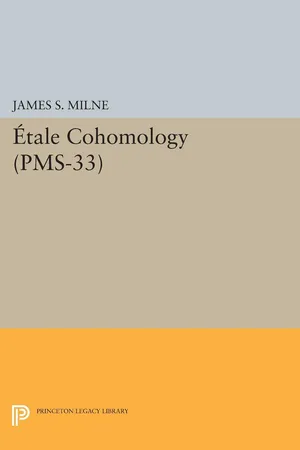
- 344 pages
- English
- PDF
- Available on iOS & Android
Princeton Mathematical Series
About This Book
One of the most important mathematical achievements of the past several decades has been A. Grothendieck's work on algebraic geometry. In the early 1960s, he and M. Artin introduced étale cohomology in order to extend the methods of sheaf-theoretic cohomology from complex varieties to more general schemes. This work found many applications, not only in algebraic geometry, but also in several different branches of number theory and in the representation theory of finite and p -adic groups. Yet until now, the work has been available only in the original massive and difficult papers. In order to provide an accessible introduction to étale cohomology, J. S. Milne offers this more elementary account covering the essential features of the theory. The author begins with a review of the basic properties of flat and étale morphisms and of the algebraic fundamental group. The next two chapters concern the basic theory of étale sheaves and elementary étale cohomology, and are followed by an application of the cohomology to the study of the Brauer group. After a detailed analysis of the cohomology of curves and surfaces, Professor Milne proves the fundamental theorems in étale cohomology -- those of base change, purity, Poincaré duality, and the Lefschetz trace formula. He then applies these theorems to show the rationality of some very general L-series.Originally published in 1980.The Princeton Legacy Library uses the latest print-on-demand technology to again make available previously out-of-print books from the distinguished backlist of Princeton University Press. These editions preserve the original texts of these important books while presenting them in durable paperback and hardcover editions. The goal of the Princeton Legacy Library is to vastly increase access to the rich scholarly heritage found in the thousands of books published by Princeton University Press since its founding in 1905.
Frequently asked questions
Information
Table of contents
- Cover
- Title
- Copyright
- Dedication
- Contents
- Preface
- Terminology and Conventions
- CHAPTER I. Étale Morphisms
- CHAPTER II. Sheaf Theory
- CHAPTER III. Cohomology
- CHAPTER IV. The Brauer Group
- CHAPTER V. The Cohomology of Curves and Surfaces
- CHAPTER VI. The Fundamental Theorems
- APPENDIX A. Limits
- APPENDIX B. Spectral Sequences
- APPENDIX C. Hypercohomology
- Bibliography
- Index